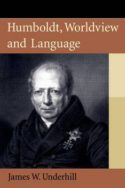
ABOUT THIS BOOK
PUBLISHER: Edinburgh University Press
FORMAT: Paperback
ISBN: 9780748679096
RRP: £24.99
PAGES: 312
PUBLICATION DATE:
January 11, 2013
BUY THIS BOOK
As an Amazon Associate and Bookshop.org affiliate we earn from qualifying purchases.
Creating Worldviews: Metaphor, Ideology and Language
James W. Underhill
This title explores metaphor theory in the work of contemporary European scholars. This book encourages readers to reflect upon language and the role metaphor plays in patterning ideas and thought. It first offers a critical introduction to metaphor theory as it has emerged over the past thirty years in the States, then widens the scope of metaphor theory by investigating not only the worldview our language offers us, but also the worldviews which we adapt in our own ideological and personal interpretations of the world. James Underhill explores new avenues in metaphor theory in the work of contemporary French, German and Czech scholars. Detailed case studies marry metaphor theory with discourse analysis in order to investigate the ways the Czech language was reshaped by communist discourse, and the way fascism emerged in the German language. The third case study turns metaphor theory on its head: instead of looking for metaphors in language, it describes the way language systems (French & English) are understood in terms of metaphorically-framed concepts evolving over time.Including a multilingual glossary of key terms and concepts, this is an ideal volume for anyone new to the topic, as well as those already interested in metaphor theory and the analysis of worldviews.
Reviews of Creating Worldviews: Metaphor, Ideology and Language
"'Underhill follows through on what he sees as lacking in metaphor studies: he shares insights from non-English-speaking scholars, he examines individual speech, he translates from other languages, he notes the history of concepts, and he demonstrates individuals not being entirely subsumed by the discourse of a prevailing ideology. For all these characteristics, this book is an invaluable contribution to the field of metaphor studies… Besides cognitive linguists, this book will also be invaluable for critical discourse analysts wishing to incorporate the study of metaphor into their work and for ethnographers who examine the history of the community of their research, as well as for scholars of rhetoric and of worldview.' (Linguist List)"
James W. Underhill
James W. Underhill lectures on Translation Studies at Stendhal University, Grenoble, France.











